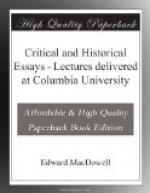The next powerful influence in France, and indeed in all Europe, was that of Rossini. He may be said to have built on Gluck’s ideas in many ways. Born in 1792, at Pesaro, in Italy, he wrote many operas of the flimsy Italian style while still a boy. At twenty-one he had already written his “Tancredi” and the opera buffa, “The Italians in Algiers.” His best work (besides “William Tell”) was “The Barber of Seville.” Other works are “Cinderella” (La Cenerentola), “The Thieving Blackbird” (La Gazza Ladra), “Moses,” and “The Lady of the Lake.” These operas were mostly made up of parts of others that were failures, a la Hasse. An engagement being offered him in London, he went there with his wife, and in one season they earned about two hundred thousand francs, which laid the foundation for his future prosperity.
The next year he went to Paris, where, after a few unimportant works, he, produced “William Tell” with tremendous success (1829). Although he lived until 1868, he never wrote for the operatic stage again, his other works being mainly the well-known “Stabat Mater” and some choruses. He was essentially a writer of light opera, although “William Tell” has many elevated moments. His style was so entirely warped by his love for show and the virtuoso side of singing that the many real beauties of his music are hardly recognizable. His music is so overladen with fioriture that often its very considerable value is obscured. He had absolutely no influence upon German music, for the Germans, from Beethoven down, despised the flimsy style and aims of this man, who, by appealing to the most unmusical side of the fashionable audiences of Europe, did so much to discourage the production of operas with a lofty aim. In France, however, his influence was unchallenged, and we may almost say that, with few exceptions, the overture to “William Tell” served as a model for all other operatic overtures which have been written there up to the present day. We have only to look at the many overtures by Herold, Boieldieu, Auber, and others, to see the influence exerted by this style of overture, which consisted of a slow introduction, followed by a more or less sentimental melody, followed in turn by a galop as a coda.
So fashionable had this kind of thing become that even Weber was slightly touched by it. In the meanwhile, the French composers were producing operas of a smaller kind, but, in many ways, of a better character than the larger works of Rossini, Spontini, and their followers. Had this flimsy Italian influence been lacking, doubtless French opera to-day would be a different thing from what it actually is. For these smaller operas by Herold, Auber, and Boieldieu had many points in common with the German Singspiel, which may be said to have saved German musical art for Wagner.
What might have developed under better conditions is shown in a work by Halevy entitled, “La juive,” in which is to be found promise of a great school of opera, a promise unhappily stifled by the advent of an eclectic, the German Meyerbeer, who blinded the public with unheard of magnificence of staging, just as Rossini before him had blinded it by novel technical feats. Meyerbeer thus drew the art into a new channel, and, unluckily, this new tendency was not so much in the direction of elevation of style as in sensationalism.




